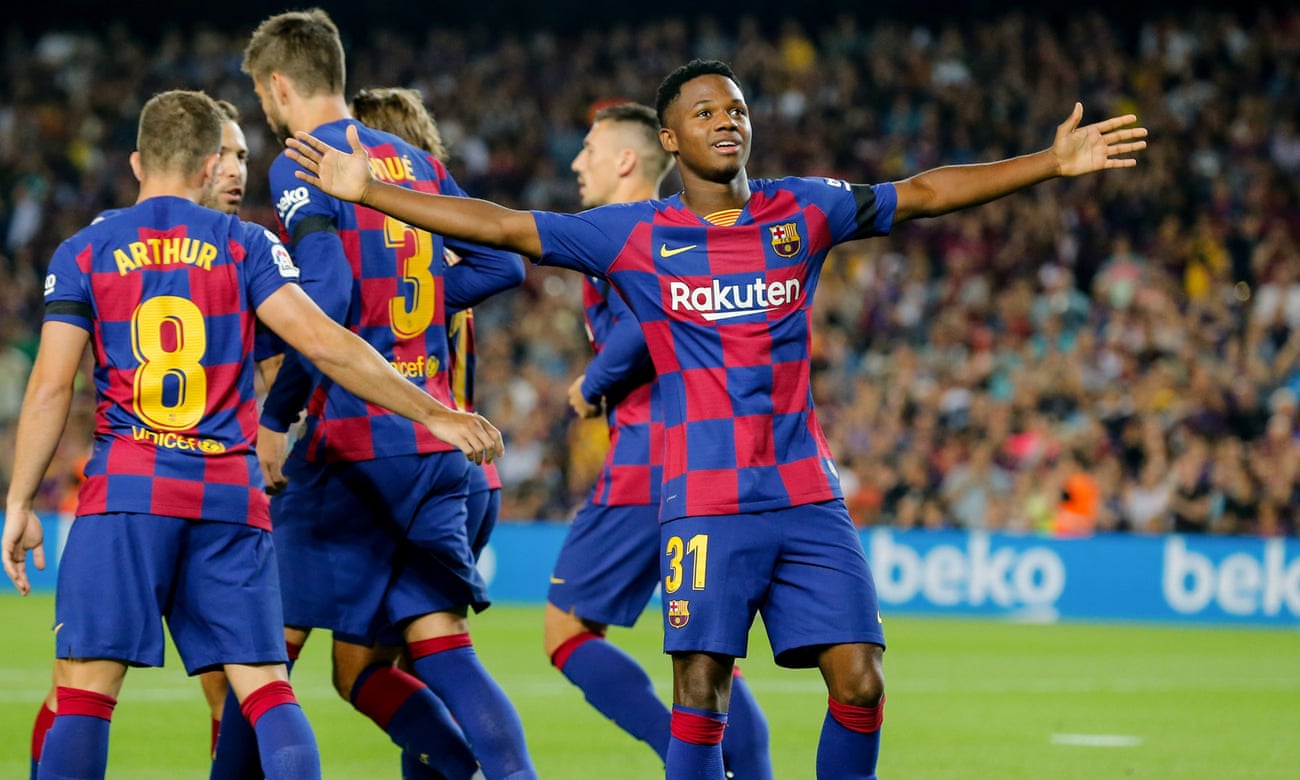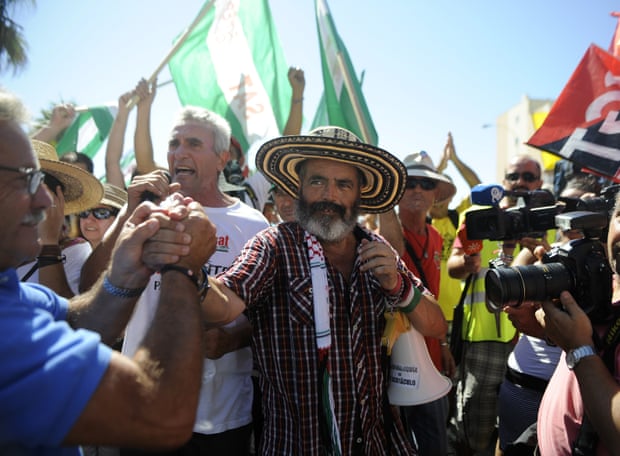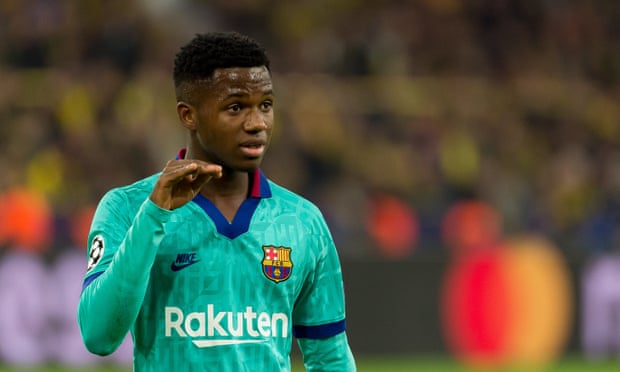'A star is born': Ansu Fati announces himself and changes his world .

Ansu Fati celebrates after scoring the opening goal for Barcelona against Valencia.
This wasn’t one of those things that just happens. It wasn’t something you watch; it was something that takes you with it.
This story starts in a self-proclaimed communist utopia, a tiny village in the Andalucían countryside where Che Guevara looks out from the sports ground, Republican flags adorn the town hall and political murals are painted on walls; a small, isolated place with no police where much of the 2,626 population live in identical homes they built themselves and the town’s seal depicts a dove of peace with an olive branch; where they organised raids on supermarkets to feed people, public salaries are equal, collectives work the fields, land confiscated from the aristocracy, and the mayor is fond of Che’s line: only those who dream will someday see their dreams become reality.
Which is appropriate, even if this reality wasn’t the dream they had. One hundred and one kilometres east of Seville, Marinaleda is, as the title of Dan Hancox’s fascinating book calls it, the village against the world. The mayor since 1979 is Juan Manuel Sánchez Gordillo, who has the kind of beard you’re supposed to have when you’re a founder of the Collective for Workers’ Unity, an instigator of hunger strikes, and the political leader of a place like this – described as Spain’s Robin Hood – when you’ve been jailed seven times and the target of at least two assassination attempts.
One day, or so it goes, Sánchez Gordillo met Bori, a Guinean who had left Bissau first and Portugal next to come to Spain alone after his wife became pregnant. Bori had nothing, was in a bad way, and had heard Marinaleda was a place where they looked after people. Thrust into the media lately, he says he became Sánchez Gordillo’s driver (although other versions have him behind the wheel of a rubbish truck) and they became close. The mayor looked after him, gave him work, somewhere to stay, and helped to bring his family over. Bori also worked on the construction of the railway, and turned his hand to anything he could. His wife and two sons joined him and they set up home in Herrera, 10 kilometres away.

Juan Manuel Sánchez Gordillo, pictured in August 2012.
Wearing swimming shorts and in bare feet, aged six, one of his sons went to play football at the local club, where they couldn’t believe what they saw. They knew immediately; some even dashed to the family home to break the news. Unbeknown to Bori, it turned out his son was good at football. Very, very good at football.
On Saturday night, he scored 111 seconds into his first ever start for Barcelona, standing there arms outstretched in front of 81,617 people.
He is 16.
When Ansu Fati was called up to train with the first team, he didn’t eat and he didn’t sleep, his dad said. Meanwhile, Bori and his wife cried. Ansu had never even played for the B team before. When he ran on at the Camp Nou, there was a look of incredulity in his eyes. At 16 years, 298 days he was the second youngest player ever to play for Barcelona – Vicenç Martínez was 18 days younger when he made his debut almost 80 years before – and he looked it, too: a competition winner whose prize was to play with a professional club. But then he started playing. And then he belonged. “Daring,” Valverde called him.
But, no, that’s not this week. That was three weeks ago now. That night, Bori announced that he could “die happy”, but he would have missed so much more. The week after, Ansu came on as a sub at Osasuna. Six minutes later, he scored. At 16 years, 304 days, he was the youngest goalscorer in Barcelona’s history, the third youngest to score a La Liga goal anywhere, ever. And then on Saturday night, 111 seconds into his first Camp Nou start, he scored again, aged 16 years and 318 days.
They could barely believe this and Ansu had only just begun. This wasn’t one of those things that just happens, a coincidence. It wasn’t something you watch; it was something that takes you with it; something that seemed to take defenders with it too, disoriented and defeated, wondering if it’s real. And the conclusion was that, yes, yes, it is. That he is. Within five minutes, Ansu had left Ezequiel Garay standing like someone had secretly nailed his feet to the floor, stepping past him, and laying it off perfectly for Frenkie de Jong to make it 2-0. No one younger had ever provided an assist and scored, and it still it went on. The next time he got it, there was a nutmeg; feet flashing, he stepped inside and bent the shot this close to the top corner. He’d hardly been playing 10 minutes.
Soon he went tumbling in the area, referee José María Sánchez Martínez pointing to him and shouting: “Ansu, careful.” Replays suggested that, far from a dive, it might actually have been a penalty, but it didn’t matter. Sánchez Martínez winked indulgently; Ansu smiled and carried on. It was, El Mundo said, “one of those recitals that stirs the soul”. When he controlled on the chest and flicked the ball backwards over the head of Daniel Wass, slipping past to get it again by the six-yard box just before half-time, it was getting silly. So silly that he seemed almost embarrassed to shoot afterwards, like that would be going too far. And yet it wasn’t just silly: every pass was right, every decision too, the supposedly simple things that some find so hard. He was daring, took risks, but still completed almost 80% of his passes, only lost the ball once, and completed every dribble.
By half-time, Valverde said, his muscles were feeling the strain. And so with an hour gone, and Barcelona 3-1 up, Ansu departed. The Camp Nou stood to hand him an ovation. Waiting on the touchline, applauding too, was Luis Suárez, who scored a brilliant first within seconds to make it 4-1 and then added another on the way to a 5-2 victory over a depressed, disintegrating Valencia. Suárez is almost twice his age: the day the Uruguayan made his debut, Ansu was two. “Ansu enamours, Suárez kills,” ran AS’s headline. “What this kid’s doing is something we have to take very seriously; the hour he played was an absolute scandal.” Marca ran on: “The name’s Fati, Ansu Fati,” opening their match report with the same line El Mundo used for a headline: “A star is born.” El Mundo Deportivo declared: “A kid has become one of Barcelona’s great hopes.”
In the hope lies the risk, of course. There’s caution amidst the celebration, even as some rush to proclaim the second coming. There’s something attractive in youth that fades with time, even if the talent doesn’t, an excitement in discovery that can’t always be maintained. There’s a joy in the subversion, the explosion, the moment that’s hard to avoid and harder to maintain. Kids like Ansu bring hope, Jorge Valdano wrote, a hint of Marinaleda in his words, because they come to “break the established order”. And that utopia is difficult to meet, always just out of reach. With young players, it’s not just about what they are but what they might become, future performances projected upon them and achievements assumed. The achievements of others too; every New Someone carries a weight they never wanted, good not be good enough. The man – the kid – Ansu overtook as Barcelona’s youngest goalscorer is Bojan. “People say my career wasn’t what was expected: ‘the new Messi’,” he says. “Well, if you compare me with Messi … but what career did you expect?”
There’s celebrity, pressure, demands, exposure, infancy immediately lost. At Barcelona that’s especially true, weighed by the expectations of La Masia – as much a concept as a place, a spiritual home as much as a footballing one. And all the more so amid the often-political debate of its declining relevance. Ansu’s world is different now.
Read the rest on;
https://www.theguardian.com/footbal...mself-and-changes-his-world-barcelona-la-liga

